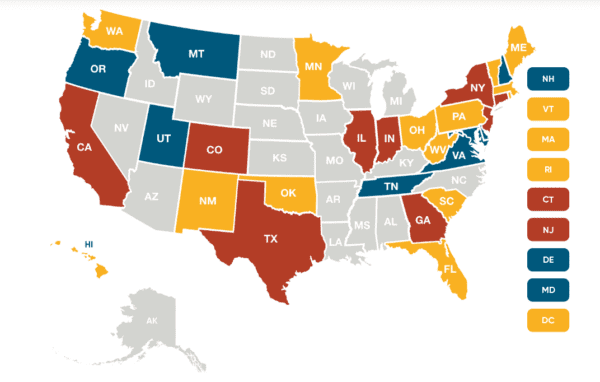Deepfake is banned in several countries, including the United States, China, and India. Other countries that have taken steps to regulate or prohibit deepfake technology include the European Union, South Korea, and Australia. These bans are in place due to concerns about the potential misuse of deepfakes for political propaganda, misinformation, and fraud. As technology advances, more countries may consider implementing similar restrictions on deepfake content.
Table of Contents
States in the USA where Deepfakes are Banned

- California – In 2018, California passed a law prohibiting deepfake technology in political campaign advertisements without disclosure.
- Virginia – Virginia has banned deepfakes for malicious purposes, such as spreading false information or committing fraud.
- Texas – In 2019, Texas became the first U.S. state to pass a law explicitly targeting deepfakes, making it illegal to create and distribute them with the intent to harm others or deceive viewers.
- Michigan – Michigan’s election laws have been updated to include a ban on using deepfake videos for political advertising without disclosure.
- New York – New York also prohibits using deepfake technology in political campaigns without disclosing its use.
- Louisiana – Louisiana has banned the creation and distribution of deepfakes with malicious intent, including harassment, revenge porn, and election tampering.
- Georgia – Georgia has criminalized the creation and distribution of deepfakes for malicious purposes, with penalties ranging from fines to prison time depending on the severity of the offense.
- Maryland – Maryland’s House of Delegates passed a bill in 2019 that would make it illegal to create or distribute deepfakes intended to deceive voters during an election.
- Colorado – Colorado has a law that makes it illegal to create or distribute deepfakes for fraudulent purposes, such as impersonating someone else or altering evidence in legal proceedings.
- Washington – Washington state has legislation that prohibits using deepfake technology in political ads without disclosure and allows individuals to sue those who have created or distributed deepfakes of them without consent.
Can Deepfakes be Tracked?
Due to the advanced technology and techniques used to create them, deepfakes can be difficult to track. However, various methods are being developed to detect and trace deepfakes, such as using digital fingerprints or analyzing inconsistencies in facial movements. Social media platforms are also implementing policies and tools to identify and remove deepfake content. While it may not be foolproof, efforts are being made to track and combat the spread of deepfakes.
Is Deepfake Legal in India?
No, creating or sharing deepfake content is illegal in India under various laws, including the Information Technology Act and the Indian Penal Code. Producing and distributing fake or manipulated videos with malicious intent is a punishable offense. However, there is no specific law that addresses deepfakes directly. As this technology evolves, further legislation may be introduced to address its impact on society.
How Harmful are Deepfakes?
Deepfakes can potentially cause significant harm by spreading misinformation or defaming individuals. They can also contribute to erasing trust in media and public figures. In some cases, deepfake videos have been used for scams or frauds, causing financial harm to victims. Furthermore, they can have psychological effects on individuals who believe false information is portrayed through deepfakes.
Is Deepfakes Web Free?
No, creating deepfake content often requires expensive software and skills in artificial intelligence and video manipulation. While websites may offer free deepfake services, their quality may not be reliable and could compromise personal data through online uploads.
Are Deepfakes Illegal in New York?
Yes, New York has laws that prohibit creating and distributing deepfake content without consent from those depicted. Violators who use these videos for malicious purposes can face criminal charges for impersonation or defamation.
Are Deepfakes Illegal in Texas?
Yes, Texas has laws against creating and distributing deepfake videos without consent. The state also has laws that specifically address deepfakes used for political purposes, making it a crime to distribute false information that could impact the outcome of an election.
Are Deepfakes Illegal in Australia?
Creating or sharing deepfake content without consent is considered illegal in Australia. The country has laws that criminalize the use of technology to deceive or defraud individuals. Additionally, distributing deepfake content with malicious intent can be charged under laws related to cyberbullying or defamation.
Frequently Asked Questions
Where are deepfakes illegal?
Deepfakes are illegal in several countries, including the United States and Germany. Creating or distributing deepfakes for malicious purposes is considered a crime in these countries.
Are deepfakes banned in the UK?
Yes, deepfakes are banned in the UK. The government has passed laws to criminalize the creation and distribution of deepfake videos that could cause harm or damage someone’s reputation.
Can deepfakes be banned?
It is possible to ban deepfakes by passing laws specifically addressing their creation and distribution. However, the effectiveness of such bans may vary depending on the country’s legal system and technological advancements.
Where can deepfake be used?
Deepfakes can be used on various online platforms, such as social media, video-sharing websites, and messaging apps. They can also be used for entertainment in movies and television shows with advanced CGI technology.
Final Thoughts
In conclusion, deepfake technology has been banned in several countries due to its potential misuse and harm. However, efforts to regulate and monitor its use are still needed to protect individuals and society from the dangers of manipulated media.
